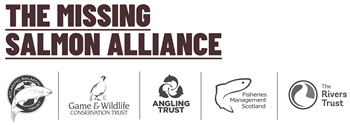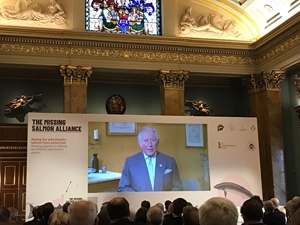 The numbers of Atlantic salmon returning to our rivers in 2018 were the lowest ever recorded, continuing a sharp decline since the 1980s. Numbers have fallen so low that conservationists fear that if rates continue, wild Atlantic salmon could be lost from many of our rivers over the next 50 years. This worrying conundrum prompted six of the UK’s most prominent salmon conservation organisations – the Atlantic Salmon Trust, the Salmon and Trout Conservation Trust, the Angling Trust with Fish Legal, Fisheries Management Scotland, The Rivers Trust and the GWCT – to form a collaboration called the Missing Salmon Alliance (MSA).
The numbers of Atlantic salmon returning to our rivers in 2018 were the lowest ever recorded, continuing a sharp decline since the 1980s. Numbers have fallen so low that conservationists fear that if rates continue, wild Atlantic salmon could be lost from many of our rivers over the next 50 years. This worrying conundrum prompted six of the UK’s most prominent salmon conservation organisations – the Atlantic Salmon Trust, the Salmon and Trout Conservation Trust, the Angling Trust with Fish Legal, Fisheries Management Scotland, The Rivers Trust and the GWCT – to form a collaboration called the Missing Salmon Alliance (MSA).
Masterminded by GWCT Fisheries trustee David Mayhew, the MSA will fight to reverse the devastating collapse in wild Atlantic salmon around the UK by combining expertise, co-ordinating activities, bringing together research and advocating effective management solutions. The collaboration will coalesce around a research programme called the ‘Likely Suspects Framework’ (LSF), which has identified all the pinch points in the salmon life history and look at ways in which they can be overcome to improve salmon conservation.
Our existing SAMARCH work will form a key part of this programme, including identifying for the first time how salmon use estuaries and coastal waters in the English Channel and Scotland. It will also provide information on how salmon survival at sea is impacted by their early juvenile stages in rivers. The collaboration will have global reach, and the LSF mirrors a similar initiative undertaken for Pacific salmon.
 The MSA was launched in November at Fishmongers Hall, who kindly sponsored the event. The Prince of Wales, Patron of the Atlantic Salmon Trust and Salmon & Trout Conservation, said in a video message to the forum: “The very future of a species that has been swimming in our oceans and seas for over 6 million years will be in jeopardy. We simply cannot allow this to happen inour lifetime. Having our four leading salmon conservation organisations working together through the Missing Salmon Alliance, with support from both the private and public sectors, is hugely encouraging.”
The MSA was launched in November at Fishmongers Hall, who kindly sponsored the event. The Prince of Wales, Patron of the Atlantic Salmon Trust and Salmon & Trout Conservation, said in a video message to the forum: “The very future of a species that has been swimming in our oceans and seas for over 6 million years will be in jeopardy. We simply cannot allow this to happen inour lifetime. Having our four leading salmon conservation organisations working together through the Missing Salmon Alliance, with support from both the private and public sectors, is hugely encouraging.”